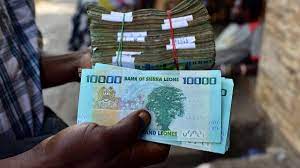Like during the great depression, the world economy is in trouble at a time when the COVID-19 pandemic has disrupted supply chains and the Russia-Ukraine war has sparked off a global energy crisis.
By Abu Bakarr Jalloh, CEO Sanussi Research & Consulting
Many economies across the globe, including in Sierra Leone and Ghana, have run out of capacity, resulting into low productivity, high inflation, weak currencies and high interest rate.
According to the Sanusi Currency Index, the Ghanaian Cedi has depreciated from $1=¢7.50 on May 31, 2022 to $1=¢13.17 on October 21, 2022, a depreciation in value of 75.60%, far more than the Sierra Leonean Leone’s depreciation of 28.89% over the same period.
The Ghanaian Cedi has been the worst performing currency in the international foreign exchange market.
Traders in Ghana closed their shops on Wednesday last week to protest the worsening economic conditions, including high inflation and sharp depreciation of the local currency against the US Dollar they usually use to buy goods and service abroad.
The president of Ghana Union Traders Associations (GUTA), Dr. Joseph Obeng said the Cedi has depreciated so much over the months primarily because of the capital outflows done by not only imports but also by Foreign Direct Investment (FDI).
In Sierra Leone, last week’s massive public outcry against sharp increase in internet cost has forced the National Telecommunication Commission (NATCOM) to direct Mobile Network Operators (MNOs) “to put on hold the implementation of the minimum floor price of Le18 (old Leones) per megabyte for telecommunication data services with immediate effects.”
In some cases, some MNOs had increased their prices sharply.
For example, Orange, one of the major MNOs had increased its prices from Le15 for 3GB to Le35 for 1.9GB, a 300% increase.
At the same time, the dramatic increase in fuel prices has made the prices of goods and services including basic food commodities such as the staple rice go through the roof.
Some economic experts suggest that inflation in Sierra Leone is as high as in Ghana, between 35-40%.
Many Sierra Leoneans have expressed concern over the worsening economic conditions that they say could undermine security and democracy ahead of the 2023 general elections.
Nearly four-in-ten Sierra Leoneans report they have lost their jobs since the pandemic.
Therefore, Sierra Leone will have to build capacity in all sectors of the economy to minimize the cost and impact of shocks such as COVID-19 and the Russia-Ukraine war.
ABJ/APA


